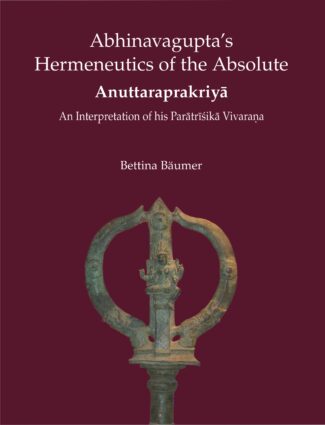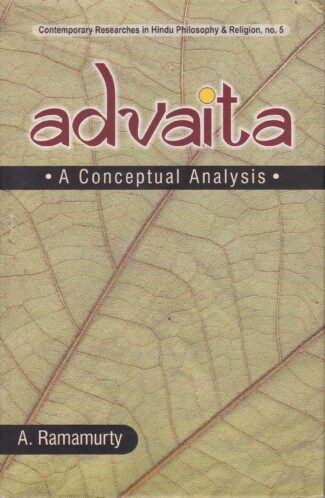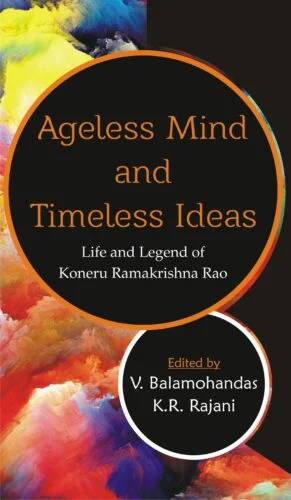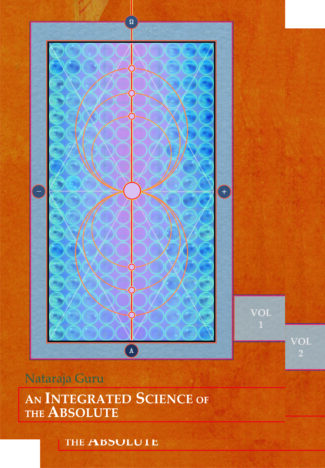Showing 1–12 of 301 results
1000 Full Moons is an anthology of 21 articles and poems, written by the students and admirers of Guru Muni Narayana Prasad like Swami Tyageswaran, Swami Tanmaya, Swami Vyasa Prasad, Scott Teitsworth, Deborah Buchanan, Andy Larkin and a few other bright minds/scholars, on the occasion of his 80th birthday. It has serious philosophical essays, fond reminisces and a few poems along with some interesting photographs marking important events in his life. The book’s philosophical reflection is a continuum of the vision and teachings of Narayana Guru, a highly venerated spiritual guru, philosopher, visionary and social reformer, and his immediate successors, Nataraja Guru and Guru Nitya Chaitanya Yati. Guru Muni Narayana Prasad, as the successor to Guru Nitya Chaitanya Yati, is an epitome of great wisdom, and is fully dedicated to Guruhood in general and to the life and teachings of Narayana Guru in particular.

This volume on Tantra philosophy, having imbibed the art of reconstructive hermeneutical exegesis (tatparya-visodhana) synergizes. Abhinavaguptas tantragamiya philosophical thought process with literature, culture, history, metaphysics, Tantric praxis as well as aesthetics. It unveils the original internal thought process of Svatantracidadvaitavada, i.e. integral dynamic idealistic absolutism in its entirety.
This volume on Tantra philosophy, by a highly esteemed author, is an unparalleled work in the realm of philosophical reflection. Having imbibed the art of reconstructive hermeneutical exegesis (tatparya-visodhana), the learned author has synergized Abhinavaguptas tantragamiya philosophical thought process with literature, culture, history, metaphysics, Tantric praxis as well as aesthetics. With unbiased academic integrity and objective conceptual authenticity he has unveiled the original internal thought process of Svatantracidadvaitavada, i.e. integral dynamic idealistic absolutism in its entirety. In this millennial decade of the immortal Acarya Abhinavagupta, this work, by virtue of its analytical and investigative insights, will serve as an intellectual homage and will stand out amidst the published literature, whether in Hindi or English, on the subject.

The Paratrishika Vivarana, an extensive commentary by Abhinavagupta on the Tantra, is one of the most profound texts of Kashmir Shaivism, and of Indian philosophy and mysticism. The present work is an important contribution to studies and interpretations of texts on Kashmir Shaivism, its spirituality and philosophy.
The Paratrishika Vivarana by the great Kashmiri philosopher and mystic Abhinavagupta is an extensive commentary on the Paratrishika Tantra, and it is one of the most profound texts, not only of non-dualist Kashmir Shaivism, but of Indian philosophy and mysticism in general. The present work attempts to make this difficult text accessible, by culling out the important themes and offering an interpretation. The main focus is on the understanding of the Absolute (Anuttara) and the ways to realize it. The central theme of mantra also leads to a mysticism of language with its philosophical implications. All these reflections and practices are inscribed in the theory that everything is related to the totality, every part contains the whole of reality (sarvam sarvatmakam). It is this holistic vision of Abhinavagupta, based on the Tantras, which makes this work so relevant in our times of fragmented aspects of life and knowledge in search of integration. No doubt, in the view of the Tantra and of Abhinavagupta, language and mantra provide the key.
This fascinating book is an important contribution to studies and interpretations on Kashmir Shaivism, its spirituality and philosophy, and on Abhinavagupta in particular.

The book presents a comprehensive study of Adhyasabhashya in the light of Panchapadika of Padmapada, Bhamati of Vachaspati Mishra, Vivarana of Prakashatma Yati, Ratnaprabha of Govindananda Yati and other Vedantic texts. The commentaries of Brahma-Sutra and Shariraka-Bhashya and definition, causes, types, and results of adhyasa have been analysed in detail.
Adyasavada is the key principle of Advaita Vedanta. Basic premise of this theory is Adhyasabhashya. Before interpreting the first brahmasutra (athat¯o brahmajijnasa (Br.Su. 1.1.1), Acharya Shankara submitted a valuable commentary known as Adhyasabhashya. The book presents a comprehensive study of Adhyasabhashya in the light of Panchapadika of Padmapada, Bhamati of Vacaspati Mishra, Vivarana of Prakashatma Yati, Ratnaprabha of Govindananda Yati and other Vedantic texts. The numerous curiosities associated with Adhyasabhashya have been resolved in the present book: What is the format of Adhyasabhashya? Without commentary on any sutra can Adhyasabhashya be considered as a commentary? Adhyasabhashya begins with sentence yushmadasmatpratyayagocara so Adhyasabhashya consists mangalacharana or not? What is the purpose of Adhyasabhashya?
Adhyasa principle is the cornerstone of Shankaravedanta. This is the theory of error of Shankaravedanta. In the context of theory of error Shankara proposed the theory of Anirvacaniyakhyativada and refuted all prior theories of error. In this book the commentaries of Brahma-Sutra and Shariraka-Bhashya and definition, causes, types, and results of adhyasa have been analysed in detail.
Although it is difficult to write something about complex and difficult theory of Adyasavada, an endeavour is being made to bring out the theory of Adyasavada for scholars through this book.
This book, a work on human doing, analyses and applies three central aspects of human life – Action, Freedom and Responsibility – in the wide spectrum of the Philosophy of Mind. Reflections on these issues and their interconnections have a significant effect on the Philosophy of Value and application of ethical theories in practical life. This book even reconstructs the conceptual connection between action and freedom, on the one hand, and that between freedom and responsibility, on the other.
It also puts the concepts of freedom and determinism to critical test and reinterprets them from different angles and perspectives. The conventional doctrine of karma, based on the teachings of the Bhagavadgātā, is relieved from its usual deterministic presentation and a logically reasonable explanation is offered.
Human actions and human agency are central concepts in the philosophy of mind and action. Free will and responsibility constitute the bedrock of the moral life of the human agents and the book pinpoints that freedom is meant to undertake the goal-oriented actions. It is, therefore, focused on the enquiry into the various aspects of philosophy of mind, as well as the philosophy of value.

The book analyses the concepts of Atman, Brahman, and the World, highlighting Sankaras advaitism. In the context of Sankaras philosophy vis-a-vis the Upanisads, it is perhaps the first to explore the meaning and functions of language.
For over a millennium, Shankaras advaitism: non-dualism, has been exposed to extensive discussion, debate, and even polemic. In modern times, it has often been viewed as a system of metaphysical thought, involving a set of several subtle, though interrelated, doctrines which all have the Upanishads at their base. But, wittingly or unwittingly, modern theoreticians/scholars tend to gloss over Shankaras acumen as a philosophical analyst though his interpretations of the Upanishadic writings have indisputably shown his uncommon, rather unrivalled, genius for logic and meticulous philosophical analysis. Professor Ramamurtys work is, thus, a departure from run-of-the-mill studies attempting, as it does, an indepth conceptual analysis of advaita vedanta. The book does not just present advaita as a system of metaphysical thought. It is essentially an off-beat effort seeking to philosophically analyse the concepts of Atman, Brahman, and the World which not only count among the fundamental concepts in the philosophic thought of the Upanishads, but also help capture the true meaning, profoundity, richness and beauty of Shankaras advaita itself. Also, in the specific contexts of Shankaras philosophy vis-a-vis the Upanishadic texts, Professor Ramamurty tries to explore, perhaps for the first time, the meaning and functions of language and the problem that stem from it. Highlighting Shankaras advaitism: his insistence on the oneness of Brahman, the book offers a unique philosophic representation of the Upanishadic vision, which the scholars of classical Indian philosophy and discerning readers would love to share alike.

The book analyses the concepts of Atman, Brahman, and the World, highlighting Sankaras advaitism. In the context of Sankaras philosophy vis-a-vis the Upanisads, it is perhaps the first to explore the meaning and functions of language.
For over a millennium, Shankaras advaitism: non-dualism, has been exposed to extensive discussion, debate, and even polemic. In modern times, it has often been viewed as a system of metaphysical thought, involving a set of several subtle, though interrelated, doctrines which all have the Upanishads at their base. But, wittingly or unwittingly, modern theoreticians/scholars tend to gloss over Shankaras acumen as a philosophical analyst though his interpretations of the Upanishadic writings have indisputably shown his uncommon, rather unrivalled, genius for logic and meticulous philosophical analysis. Professor Ramamurtys work is, thus, a departure from run-of-the-mill studies attempting, as it does, an indepth conceptual analysis of advaita vedanta. The book does not just present advaita as a system of metaphysical thought. It is essentially an off-beat effort seeking to philosophically analyse the concepts of Atman, Brahman, and the World which not only count among the fundamental concepts in the philosophic thought of the Upanishads, but also help capture the true meaning, profoundity, richness and beauty of Shankaras advaita itself. Also, in the specific contexts of Shankaras philosophy vis-a-vis the Upanishadic texts, Professor Ramamurty tries to explore, perhaps for the first time, the meaning and functions of language and the problem that stem from it. Highlighting Shankaras advaitism: his insistence on the oneness of Brahman, the book offers a unique philosophic representation of the Upanishadic vision, which the scholars of classical Indian philosophy and discerning readers would love to share alike.

This volume centres around the formulations of the Advaita theory of monism on the basis of epistemological and logical analysis of knowledge in Adhyasa Bhashya. Thinkers like G.R. Malkani, K.S. Murty and G. Misra offer alternative perspectives in understanding the doctrine of the Upanishads, i.e. the Advaitavada of Shankara
Upanishads have been viewed differently by commentators down the centuries. Philosophers have brought in their native presuppositions in interpreting the Upanishadic texts. Advaitavada (monism) of Shankara stands out conspicuous among the varied interpretations of the Upanishads. Ontology, having been basic and fundamental, logic, epistemology and ethics are parasitic on it. Thinkers like G.R. Malkani, K.S. Murty and G. Misra offer alternative perspectives in understanding concepts and doctrines of the Upanishads.
This book undertakes the study of Advaitavada of Shankara in its depth and extension. It spells out the relative cogency of Malkanis understanding of Advaita Metaphysics and Methodology, Murtys Critique of Advaita (non-dualism) and Misras Philosophical Construction of Advaita from a linguistic perspective. This volume centres around the formulations of the Advaita theory of monism on the basis of epistemological and logical analysis of knowledge in Adhyasa Bhashya.
This title is a significant addition to the existing literature on Advaita philosophy and shall be of profound interest for scholars at large.

This book for the first time tries to understand the mystical dimension of Advaita. It is an attempt to understand comprehensively the meaning and significance of brahmanubhava or Brahman realization or experience as presented by Sankara in his writings. An attempt is also made to understand the significance of Advaitic mysticism by comparing it with Christian and Islamic mysticisms.
Brahman, according to the Upanishads and Shankara, the major exponent of the philosophy of the Upanishads known as Advaita, is not a metaphysical postulate meant to explain what is empirically experienced or the word. Brahman is absolutely real and is the inner reality or essence or self of all that is there, including ones self. Therefore it is known directly and immediately as the real or true nature of ones self. In the context of human reality Brahman is known as Atman, the true reality or nature of ones self. Direct and unmediated experience or realization of Brahman or brahmanubhava is the consummation of mans spiritual life as well as the supreme fulfilment of human existence.
This is an attempt to understand comprehensively, and in depth the meaning and significance of brahmanubhava as presented and discussed by Shankara in his commentaries on the Upanishads, Brama-Sutras and the Bhagavad-Gita, and in his other minor works, like Vivekacudamani, Aparokshanubhuti and Upadesha-Sahasri. Shankara is also known for his logical acumen and analytical approach to problems of philosophy. However, the mystical dimension of his philosophy which is also the reason for the lasting relevance and significance of his philosophy has not received the attention it deserves. May be this is the first of its kind in understanding and presenting systematically the Advaitic mysticism of Shankara in all its aspects. It is entirely based on the works of Shankara.
An attempt is also made in this book to understand the significance of Advaitic mysticism of Shankara in the light of its comparison with that of St. John of the Cross and Jalalud-Din Rumi, classical representatives of Christian and Islamic mysticisms.

Ageless Mind and Timeless Ideas contains the reflections and reminiscences on the life and legend of Prof. Koneru Ramakrishna Rao by some of his students, colleagues and fellow scholars who are familiar with him and his work. The volume also includes as an Epilogue a recent address of Prof. Rao at the Centenary Conference on Psychology at Calcutta University in October 2015 Indian Psychology: A Case Study of Mahatma Gandhi.
Ageless Mind and Timeless Ideas contains the reflections and reminiscences on the life and legend of Prof. Koneru Ramakrishna Rao by some of his students, colleagues and fellow scholars who are familiar with him and his work. The volume also includes as an Epilogue a recent address of Prof. Rao at the Centenary Conference on Psychology at Calcutta University in October 2015 Indian Psychology: A Case Study of Mahatma Gandhi.
Prof. Ramakrishna Rao is both a visionary and a missionary with an incredible ability to conceptualize and concretize his ideas and the gift to live his dreams. He is an internationally acclaimed academic visionary who excelled in vastly different areas that include Psychology, Philosophy, Yoga, Education, and Library and Information Sciences. At 83, Prof. Rao is still active as a scholar and administrator. He published over 5,000 pages during the last ten years, and currently serves as the Chancellor of GITAM University.

The anthology is a tribute to Prof. Kalidas Bhattacharyya, the eminent thinker of twentieth century India. Prof. Bhattacharyya presented philosophy in an original way with scientific spirit. His metaphysics was deeply rooted in the traditions of Advaita Vedanta and Shaivism.
The anthology Alternative Standpoints: A Tribute to Kalidas Bhattacharyya is a tribute to Prof. Kalidas Bhattacharyya, the eminent thinker of twentieth-century India, on his birth centenary by his students. A distinguished philosopher and an academician, Prof. Bhattacharyya presented philosophy in an original way with scientific spirit. He was essentially a metaphysician and his metaphysics was deeply rooted in the traditions of Advaita Vedanta and Shaivism. His ultimate concern was to present a theory of freedom and a theory of the possibility of realizing that freedom.
In this collection eminent scholars have written on different aspects of his philosophy. This anthology is divided into four parts the first one concentrating on his metaphysics, the second part dealing with his views on freedom, the third one with education and science and the fourth one is a reminiscence of his student and his family members. In short this anthology tries to present a picture of Kalidas Bhattacharyya as a philosopher and also as a man within the two covers.
This volume is expected to familiarize students and present-day philosophers the persona of Prof. Bhattacharyya and his philosophical positioning and pedagogical skillset.

It is not just the magnum opus, but a truly monumental effort of a scientist-philosopher who has spent a whole lifetime to formulate a unitive science, wherein all disciplines of human questing could find a common ground a science where modern science and ancient spiritual wisdom could meet and merge like two opposite poles of a magnet. As a direct disciple of one of the great rishis of the modern age, Nataraja Guru discovers this common ground in Brahma-vidya?, which he calls the Integrated Science of the Absolute, and which has, at its base, his Gurus Dars?ana Ma?la?.
A string of hundred Sanskrit verses, composed by the mystic-poet, Narayana Guru (18541928), the Dars?ana Ma?la? is the very epitome of all visions of truth inspired by his remarkable acquisitions of Upanis?adic thought and, yet far more, by his own tapas (mystical discipline). Reproducing these highly significative verses in Roman script, along with English translations, word meanings, and extensive commentaries, Nataraja Guru not only spells out his mentors Visions of the Absolute in contemporary idiom, but also shows how these visions are fully validated by modern science.
Eclectic synthesis of varied scientific disciplines into a systematic whole is not all that Nataraja Guru accomplishes here. Rather, his book (now in third edition) is an attempt to reintroduce Brahma-vidya? as the one Master Science that embraces every branch of science, every human interest.
It is not just the magnum opus, but a truly monumental effort of a scientist-philosopher who has spent a whole lifetime to formulate a unitive science, wherein all disciplines of human questing could find a common ground a science where modern science and ancient spiritual wisdom could meet and merge like two opposite poles of a magnet. As a direct disciple of one of the great rishis of the modern age, Nataraja Guru discovers this common ground in Brahma-vidya, which he calls the Integrated Science of the Absolute, and which has, at its base, his Gurus Dars?ana Mala.
A string of hundred Sanskrit verses, composed by the mystic-poet, Narayana Guru (18541928), the Darsana Mala is the very epitome of all visions of truth inspired by his remarkable acquisitions of Upanisadic thought and, yet far more, by his own tapas (mystical discipline). Reproducing these highly significative verses in Roman script, along with English translations, word meanings, and extensive commentaries, Nataraja Guru not only spells out his mentors Visions of the Absolute in contemporary idiom, but also shows how these visions are fully validated by modern science.
Eclectic synthesis of varied scientific disciplines into a systematic whole is not all that Nataraja Guru accomplishes here. Rather, his book (now in third edition) is an attempt to reintroduce Brahma-vidya as the one Master Science that embraces every branch of science, every human interest.
| There are no products |